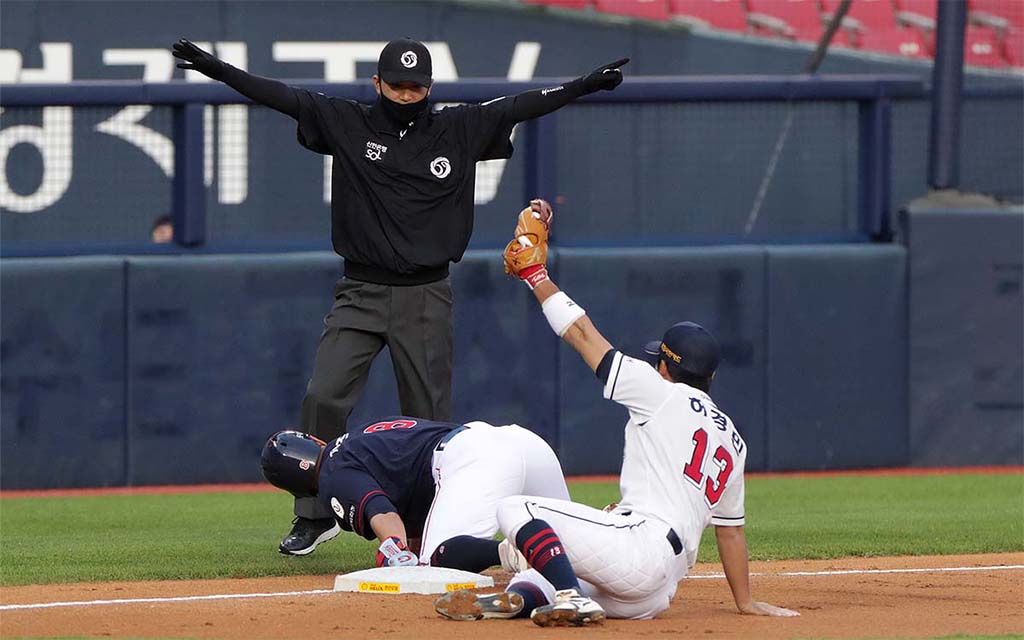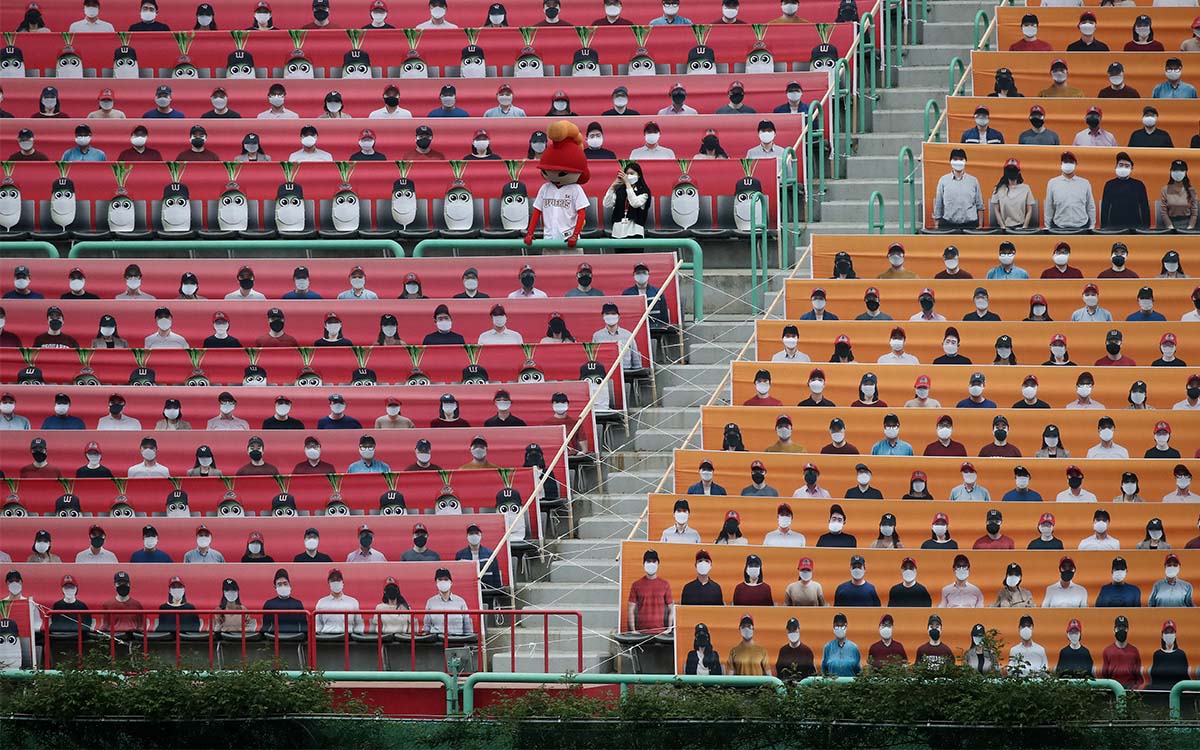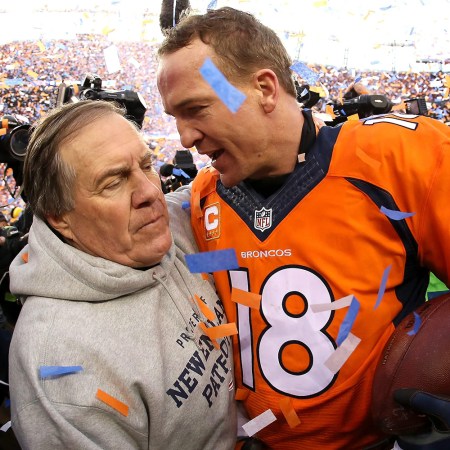Understanding the twisting turns and terms of Major League Baseball’s ongoing labor dispute with the MLB Players Union requires a similar attention span to that final, open-ended problem on a precalculus test: At this point, the season could stretch anywhere from 48 to 82 games. Players could earn up to 75% of their prorated salaries and may miss out on playoff cash entirely. “Draft-pick compensation,” of all things (even baseball diehards don’t follow the league’s draft), has become a sticking point. A once-daydreamed July 4th Weekend start is now firmly off the table. Radio hosts, starved for content, started yelling at players a couple weeks ago, then yelling at owners. Now, they’re yelling at everybody.
If the regular season does total just 48 games — and we could potentially have an answer on that this week — you’re not alone in wondering whether baseball might just be better off taking a year’s sabbatical. That’s not to ignore the severe toll an MLB-less 2020 would have on the sport’s entire economic ecosystem: no $36 million paychecks for Gerritt Cole and Mike Trout aside, a lost season would effectively guarantee devastating summers for league staffers, vendors, ushers, janitors, local sports bars, beat writers, broadcast crews and merchandisers.
But a season that short is nonetheless difficult to comprehend. It would almost certainly suffer from an identity crisis. Some days it will feel like a stretched-out Spring Training, while eventually (probably 25 games in), it will take on the feel of a chaotic sprint to the postseason. Even if baseball somehow manages to check its many COVID-19 boxes — games without crowds, constant testing, limited travel, neutral sites, no reported cases throughout the entire league, in-game social distancing measures enforced — the end result is a bunch of players fighting for a title that will supersede even the Houston Astros’ 2017 asterisk. Playing will mean not only putting themselves in harm’s way for the virus, but also for a likely injury due to the compressed schedule, all while far away from their families trying to win a league that looks unrecognizable.
It is exhausting to think about, which is an unfamiliar sensation, because baseball is supposed to be a lot of things — exhilarating, relaxing, boring — but never exhausting.
As the national pastime’s engines have sputtered, though, the game has resumed action on the other side of the world, in South Korea’s Korean Baseball Organization (KBO), a 10-team, 38-year-old league hitherto known for egregious bat flip compilations, its status as a foreign outpost for American ballplayers to transform their careers (see: Eric Thames), insatiable crowds that stand and chant the entire game, and for being the hometown league of former Los Angeles Dodgers star pitcher Hyun-jin Ryu, who signed a $90 million deal with the Toronto Blue Jays this offseason.

In late April, understandably concerned by several months of uncertain programming, ESPN struck a deal with Eclat, the international rights dealer for KBO, to broadcast KBO games. The deal arrived after a head-scratching squabble (ESPN did an uncomfortable colonizer impression for a week, and tried to acquire the rights for free), but resulted in the Walt Disney property paying a nominal rights fee. The league’s season was able to begin as early as May 5th, thanks to the South Korean government’s nonpareil response to coronavirus: the country effectively deployed isolation guidelines written after the 2015 MERS Outbreak, and leveraged contract tracing to limit the nationwide death toll to just 273 people. South Korea has a population of 50 million.
ESPN’s first KBO broadcast began at one in the morning. Some 173,000 viewers tuned in, even with a rain delay pushing the first pitch well into the early morning for East Coast residents. Since that first contest, a 4-0 win for the NC Dinos over the Samsung Lions, ESPN has faithfully broadcast one KBO game each day, except for Mondays, when the KBO has off, usually starting at 5:30 AM (a 6:30 PM start in South Korea). The network then re-broadcasts that same game at 2:00 PM on ESPN 2. ESPN hasn’t shared ratings yet, but its digital arm has covered the league over the last month, providing periodical power rankings, profiles of Korean ballplayers who have made it big on this side of the Pacific, and reminders on how and when to watch games. Somewhat stunningly, the league (which plans on having a slightly truncated 144-game season) has already played 29 games.
Some observers outside ESPN, most notably GEN’s Drew Magary (a former Deadspin writer) have called for the platform to amplify the property it acquired, and put some legitimate backbone into promoting the KBO. Magary wrote a delirious, delightful, Hunter Thompson-but-on-weed essay on staying up for much of the night to watch a game between the NC Dinos and LG Twins, and among a number of conclusions (he’s a fan), he pointed out that ESPN higher-ups ” … don’t seem terribly invested in [KBO games]. They don’t lead off SportsCenterwith KBO highlights. They don’t wallpaper the dot-com with KBO news and box scores.” Magary provides a few potential reasons as to why: “I’m sure the late-night game times factor into the equation, but I’m also sure that a combination of snobbery, xenophobia, laziness, and lack of financial interest are the more decisive factors.”
What’s so surprising, from the perspective of an American baseball fan, is how easy it is to agree with Magary. Not necessarily with his hotter, latter takes, but with the idea, in general, that more KBO is a good thing right now. There is a lot to like about this league, and recent reporting from ESPN writers like Joon Lee and Dan Mullen will make you want to experience South Korean baseball for yourself, especially as the MLB continues to fight over commas. Lee has an extensive knowledge of the league, and recently wrote an outrageous yet surprisingly affecting piece about a large, white-bearded former University of South Carolina lecturer named Kerry Maher who moved to South Korea years ago and is a superfan of the KBO’s Lotte Giants ballclub. Locals take pictures with Maher and call him “Santa Grandfather.” Mullen, meanwhile, recorded a two-week deep-dive into NC Dinos fandom, having come in completely blind. His Dinos are 23-6 and the top of the league; his wife’s team, the KT Wiz, are currently 11-18.
ESPN should keep this content coming, and those who miss baseball should give the KBO a shot. It definitely helps to have a rooting interest; baseball, more than most sports, thrives on fandom, on personal investment. That may not have to apply at a game — consuming cold beer and fried food in the sun is a delightful day, no matter who’s playing — but for watching baseball on television, and making an effort to do so at potentially odd hours of the day (your options are baseball with a very early plate of eggs, or baseball on a seven-hour taped delay), it helps to care about the outcome. There is a natural comedic angle whenever a fan starts checking the box score for a league few others care about. (Think: ironic XFL supporters.) And the KBO is funny, there’s no doubt about that: cheerleaders dance on the dugouts, players have bespoke walkup music, paper cutouts of people fill the stands (who are sometimes replaced by stuffed animals), and the bat flips really are despicably fantastic.
But it’s still baseball, and the KBO largely features a style of play that would appeal to many of America’s purists. Stolen bases and bunts are prioritized, few teams employ the dramatic shifts that have taken over baseball back home, and the “three true outcome” trend (home run, walk, strikeout), which has made the MLB predictable and unwatchable for so many, has not yet taken hold in the KBO, where batting averages are actually higher. It’s been less than 30 games, but two players, Jin Sung Kang and Jose Fernandez, are currently batting well over .400. The quality is somewhere between Triple A and Double A ball, and because each team is only allowed three foreign players, the league is a mix of North American journeymen and young South Korean talent that could one day make it to the MLB. But the country is better at the sport than you think. It even earned a silver medal at the World Baseball Classic in 2009, beating out an American squad that had Derek Jeter, David Wright and Ryan Braun.
By the fall, the interest of ESPN and Americans at large could fade for the KBO — especially if MLB makes it through this thicket. That’s okay. The KBO has enjoyed its unexpected international exposure, but knows who its true fans are. It hopes to be introducing them back to seats in time for their version of the World Series, the Korean Series, which will take place this November. Still, with baseball so far away in the States and more than 50 days until the NBA’s Orlando project begins, there’s simply no need to be watching marble racing. Use ESPN’s primer to pick a team (it compares KBO teams to MLB clubs — the bumbling, lovable Hanwha Eagles are the Chicago Cubs; the 11-title Kia Tigers are the New York Yankees), then tune in to KBO games this week. You can either record them or just watch the re-broadcasts on ESPN2. It won’t look too familiar for an inning or so — the empty stands won’t help — until, inevitably, someone hits a double, or robs a home run, or crashes into the center-field wall. Just crack open a beer and take a deep breath. You’ve been here before.
Whether you’re looking to get into shape, or just get out of a funk, The Charge has got you covered. Sign up for our new wellness newsletter today.























